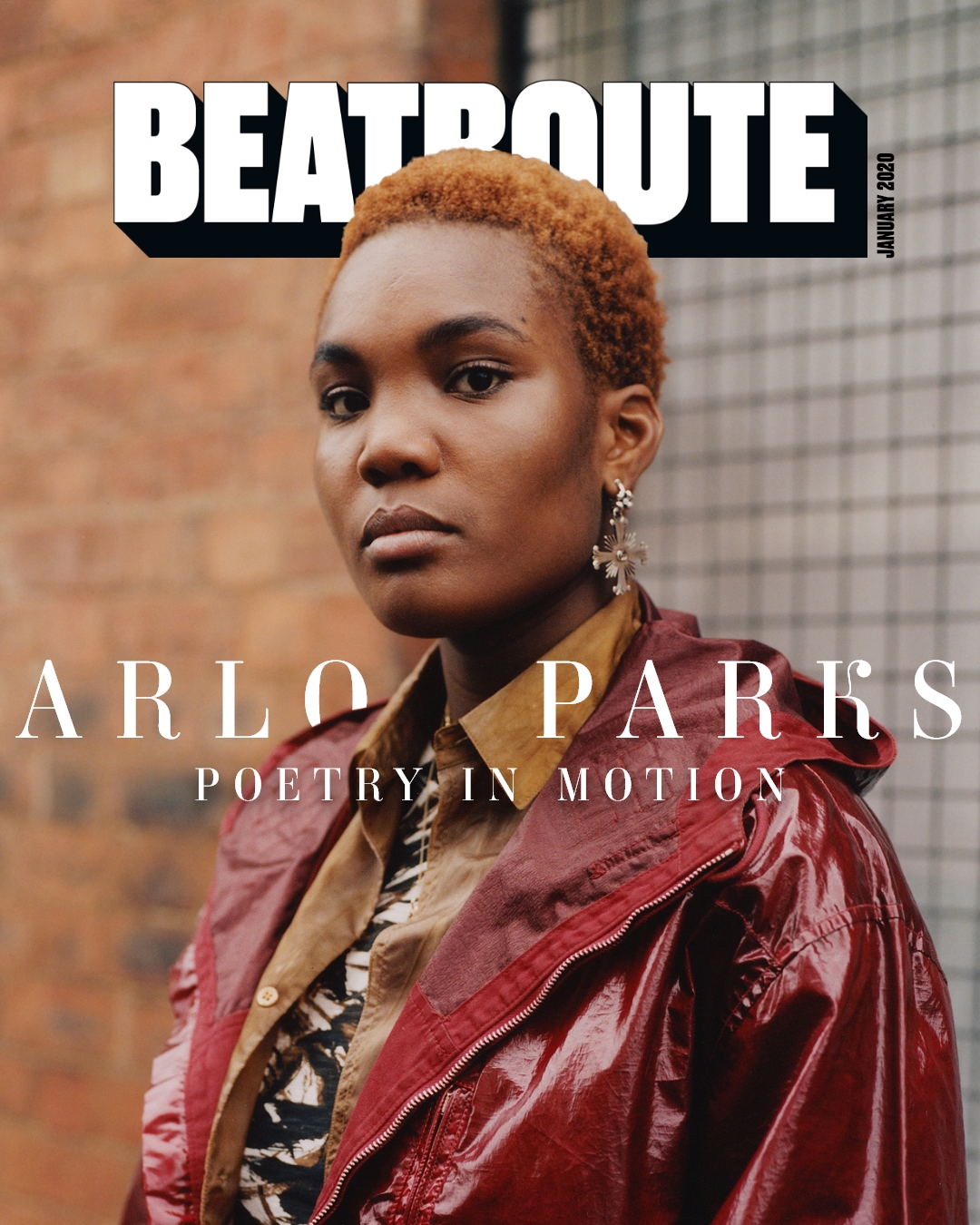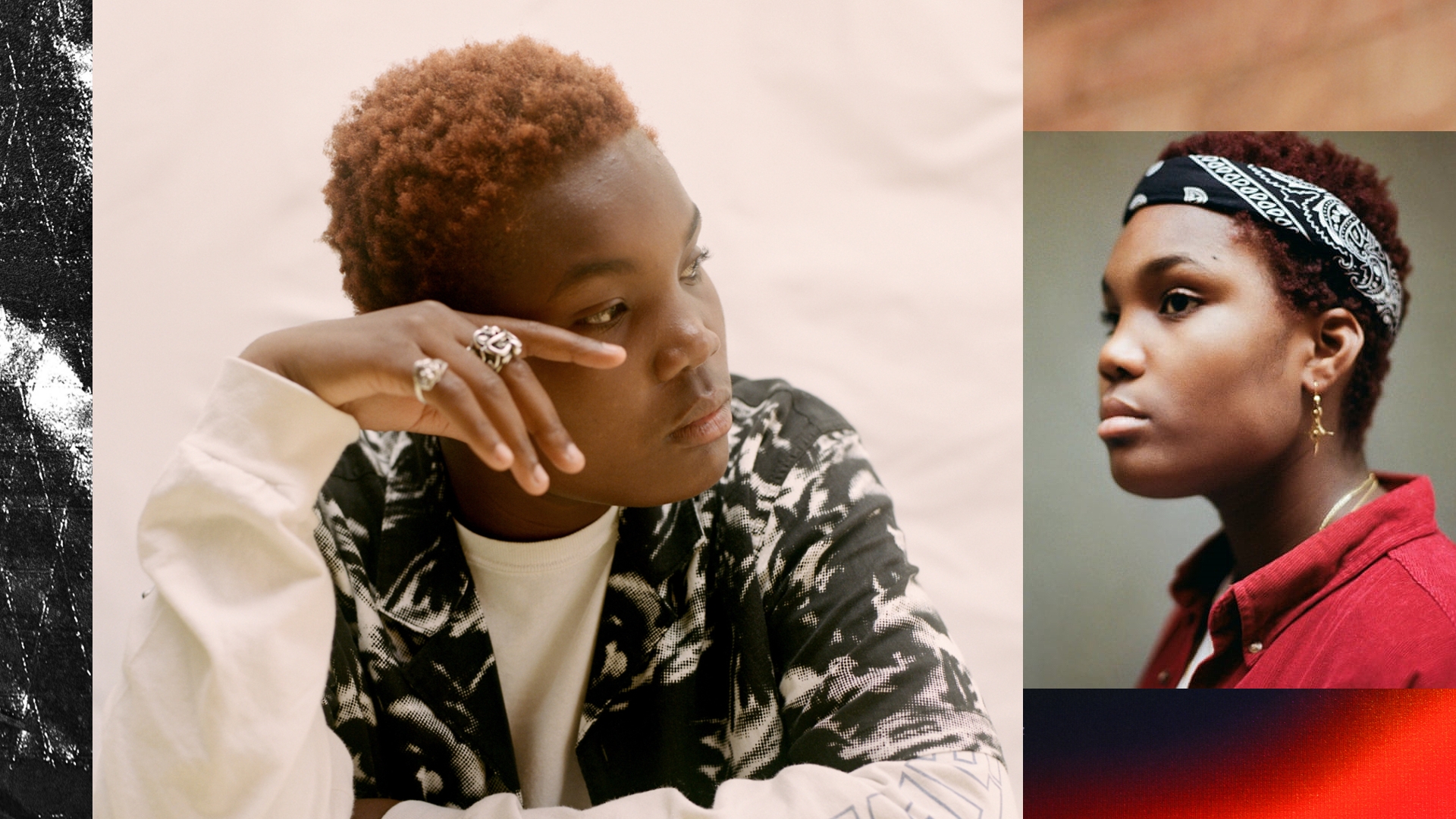COVER
Arlo Parks
Poetry in Motion
By Glenn Alderson
Publishing date: Jan 11, 2021
A
Arlo Parks will be the first to admit she wasn’t one of the “cool kids” growing up in the small artsy district of Hammersmith in West London. But that hasn’t stopped her meteoric rise to popularity over the course of the last year.
“The cool kids escaped me,” the 20-year-old singer, songwriter, and poet says, talking to us over Zoom from her attic bedroom inside her childhood home. Parks has been writing poetry since she was eight years old in this very room. A small but tidy space with slanted ceilings and warm lighting, she is surrounded by her candles and posters of Jimi Hendrix, David Bowie, and MF Doom on the walls.
She first learned how to play guitar and experimented with GarageBand in her early teens, far removed from the burgeoning music scene in the city’s southside that has seen the recent rise of artists like indie troubadour King Krule and post-punk troublemakers Shame. “In terms of creating, I was always very much in my own little bubble, just making music in my house,” she says. “I wasn’t really part of a community of artists when I started.”
Parks has since carved out a place for herself in several artistic communities following the release of her celebrated 2019 EP, Super Sad Generation, which earned her more than three million monthly listeners on Spotify. One of those listeners was Gucci’s creative director, Alessandro Michele, who cast Parks in his inaugural Gucci Film Festival, positioning her alongside modern-day musical icons like Billie Eilish, Harry Styles, and Lana del Rey—all mainstays with the fashion house.
Arlo Parks will be the first to admit she wasn’t one of the “cool kids” growing up in the small artsy district of Hammersmith in West London. But that hasn’t stopped her meteoric rise to popularity over the course of the last year.
“The cool kids escaped me,” the 20-year-old singer, songwriter, and poet says, talking to us over Zoom from her attic bedroom inside her childhood home. Parks has been writing poetry since she was eight years old in this very room. A small but tidy space with slanted ceilings and warm lighting, she is surrounded by her candles and posters of Jimi Hendrix, David Bowie, and MF Doom on the walls.
She first learned how to play guitar and experimented with GarageBand in her early teens, far removed from the burgeoning music scene in the city’s southside that has seen the recent rise of artists like indie troubadour King Krule and post-punk troublemakers Shame. “In terms of creating, I was always very much in my own little bubble, just making music in my house,” she says. “I wasn’t really part of a community of artists when I started.”
Parks has since carved out a place for herself in several artistic communities following the release of her celebrated 2019 EP, Super Sad Generation, which earned her more than three million monthly listeners on Spotify. One of those listeners was Gucci’s creative director, Alessandro Michele, who cast Parks in his inaugural Gucci Film Festival, positioning her alongside modern-day musical icons like Billie Eilish, Harry Styles, and Lana del Rey—all mainstays with the fashion house.

I think collaborating is one of the most important parts of making stuff.
I think collaborating is one of the most important parts of making stuff.
After proving herself more than capable and comfortable in front of the camera, Parks was invited to create a short film for the Gucci X Dazed short film series, Absolute Beginners. Inspired by French New Wave and the work of Wes Anderson, her vintage-style short film “knotted gold” marks her directorial debut and provides a suitable backdrop for her poem of the same name with its bright colors and wide shots in and around a proper English country club.
Effectively mirroring her effortless high-fashion aesthetic on film, the intersection between her music and style is a result of a very particular vision that she has cultivated from a young age. “I’ve always just had very specific tastes, and I’ve always gravitated towards certain color palettes,” Parks says. “I look up to people like Tyler The Creator and his use of bold, vibrant colors.” Much like her music, Parks’ style is very much her own which ranges from a mix of loud prints on short-sleeve button-ups to baggy hoodies with a handkerchief headband—always accentuated by an earring dangling from her left ear that was made by her grandmother. “I’ve always had quite an androgynous style and I’ve always loved jewelry,” Parks says. “I think honestly, my style is just what I like and that is what I will wear.”
With her debut LP, Collapsed In Sunbeams, due out at the end of January, Parks has been gaining momentum in the music industry with a stacked list of talented new friends on speed dial. In just the past few months, Parks has found herself lending her talents to a number of collaborations, including Glass Animals’ juicy single “Tangerine,” where her vocals notably enrich the psychedelic pop band’s feel-good sound, and a live recording of Radiohead’s seminal “Fake Plastic Trees,” accompanied by Phoebe Bridgers for BBC Radio 1’s Piano Sessions. “I’ve got friends in a lot of different genres of music,” she says. “I think collaborating is one of the most important parts of making stuff because when you get two artists who are so passionate and have their own processes, it’s interesting to see how they collide.”

When I write words down I never know if it's going to be a poem or if it's going to be a song.
Outside of her many collaborations, Parks continues to rack up accolades on her own. She recently nabbed the BBC Introducing Artist of the Year award, a distinction that signals just how far she’s come since first uploading her DIY Soundcloud Demos for consideration of the same award four years prior at the age of 16. “It feels so weird to have all these things happening in my career when I’m just posted at home playing Scrabble with my dad,” she says in disbelief of the unusual circumstance of experiencing her rise to fame from the comforts of her couch. “I’m living a very wholesome existence while things are expanding so much in terms of [my career].”
There’s a gentle stillness to the way Parks carries herself—both in life and in her artistry. Calm, cool, and connected—especially to her rapidly expanding fanbase. She recently selected 50 people from her mailing list to join her on an intimate video hang where they discussed things like Radiohead (her favorite band), how to manage anxiety, the healing powers of crystals, and everything in between. The process of tearing down these barriers and communicating with her fans on a personal level is a form of therapy for her. “The idea of having a tangible positive effect on people’s lives is something I’m grateful for every day because when I was younger it’s all I wanted to do,” she says. “I remember looking at an old journal entry not long ago and it literally said, ‘I want somebody who I don’t know to feel moved by my music.’ And now I’m grateful that this happens quite a lot. The kid in me would be freaking out a bit because it feels like my dreams are coming true.”
Collapsed In Sunbeams may be her official debut but to call Parks a breakout artist is something that has always confused her. “I’ve never really understood what it meant,” she confesses. “When are you not broken? When have you done it? It’s so hard to quantify, but to me breaking out is when you enter the public consciousness in a bigger way.” Accented by her soothing aura with songs that linger like lavender-scented aromatherapy, Parks is making her mark and breaking out in a big way with her latest offering. As vulnerable as it is compassionate, Sunbeams exposes Parks as a master of her craft with its unique blend of nu-jazz and indie-pop melodies that accompany her authentic voice and empathetic prose.
Because of the empathy that her lyrics and poems exude, Parks is often credited as the voice of Generation Z—a moniker she admittedly isn’t too fond of. “Honestly, that’s the problem though because every single person born in the same bunch of years is just an individual,” she says of the categorization. “I feel like the idea of having overarching personality types is so silly.” In fact, Parks has already resonated far beyond any specific demographic. Her recent single, “Eugene,” caught the attention of former First Lady Michelle Obama, who included it on a playlist inspired by the first season of her new podcast, and Angel Olson (the last live show Parks attended before the lockdown) who also featured Parks on a recent playlist. Paramore’s Hayley Williams invited Parks to join her on her next tour once things get back to normal. “It’s crazy,” Parks says beaming through the computer screen. “The kid in me is screaming because I loved Paramore when I was growing up.”
Regardless of who is listening, from the outside looking in, the dichotomy between Arlo Parks the poet and Arlo Parks the songwriter is a parallel that offers a rich depth to her artistry as a whole, but according to Parks, there isn’t a difference between the two at all. “No, for me they’re completely intertwined,” she says confidently. “When I write words down I never know if it’s going to be a poem or if it’s going to be a song.” Eager to start touring again, Parks recently wrote a poem entitled “Electric Blue,” which she recited beautifully for BeatRoute. The poem captures the energy and intense emotions often tied to a live performance in an effort to fill the void that the absence of live music has left since the onset of the pandemic.
With live dates already scheduled in the UK for Spring 2021, it won’t be long before Parks is back on the road, performing late-night television spots and selling out mid-sized concert halls all over the world. But until that day comes, she has gifted us a beautiful creation that comes in the form of 12 fluid tracks. One song on the album of particular significance to Parks is “Hope,” because of its uplifting sentiment that rises to the top of the track’s bouncy bossa nova beat. “It’s kind of the centerpiece of the record,” she says. “It’s the message that I want to convey to the world, especially during this weird time; the fact that things will get better. And that, even though we’re isolated, we’re not alone in our struggles.”
While the new year will undoubtedly come with many unpredictable surprises, Parks has big plans now that she’s been crowned one of the certified “cool kids” by the various artistic communities she’s now present in. “I just want to collaborate a lot more. I also want to have gone into other areas of art. Whether it be directing, acting, or curating, I want to expand my horizons in general.”
Collapsed in Sunbeams is out now via Transgressive Records.
